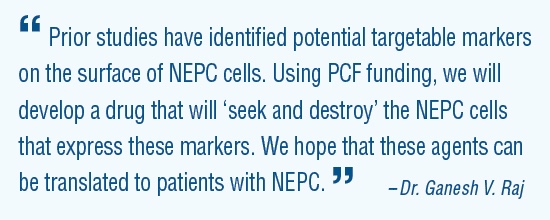Foundation awards $1 million for Prostate Cancer Center

Dr. Ganesh V. Raj
By Sharon Reynolds
Physician-scientists at UT Southwestern are fundamentally redefining how prostate cancer is treated through specialized patient care and treatments that help to reduce fear, suffering, and death from this disease. The Medical Center plans to expand its current program by developing a collaborative Prostate Cancer Center that has the potential to become an industry leader in both caring for patients with the disease and those at risk.
Boosting these efforts at UT Southwestern is a $1 million research award from the Prostate Cancer Foundation (PCF) to aid the study of neuroendocrine prostate cancer (NEPC), a rare and lethal form of the disease. The PCF award enables significant collaboration between multiple UT Southwestern research groups across various departments on campus, working toward a shared goal of developing individualized treatments tailored to each patient.

“This award provides vital programmatic support for a significant focus of research within our prostate cancer program,” said Dr. Daniel K. Podolsky, President of UT Southwestern. “This funding creates important new opportunities to translate research into groundbreaking therapies for neuroendocrine prostate cancer, an area where more effective therapies are badly needed.”
Dr. Ganesh V. Raj, Professor of Urology and Pharmacology, is a national leader in prostate cancer clinical care and research who oversees UT Southwestern’s Prostate Cancer Program. He hopes the Center will unite scientists from many departments under a common umbrella for programmatic development of basic science and translational studies to uncover what causes prostate cancer, how it progresses, and why the tumors of some patients respond well to treatment while others do not.
With the award, Dr. Raj will develop and test new drugs to target NEPC, with the goal of advancing them to clinical trials for patients.
“Many prostate cancers are relatively slow growing and may take years, if not decades, to metastasize outside the prostate. However, NEPC is a lethal, therapy-resistant form that is rapidly growing and usually leads to death within a year of diagnosis,” Dr. Raj said. “Prior studies have identified potential targetable markers on the surface of NEPC cells. Using PCF funding, we will develop a drug that will ‘seek and destroy’ the NEPC cells that express these markers. We hope that these agents can be translated to patients with NEPC.”
Prostate cancer develops in the prostate, a gland in the male reproductive system. According to the National Cancer Institute, it is the most common cancer for men and the second leading cause of cancer death among men in the U.S. More than 4 million men are living with the disease, and each year, nearly 32,000 men die from the disease.
A diagnosis of prostate cancer can have a lifelong impact on a man and his loved ones. In many cases, particularly when it is found early, it can be successfully treated. However, diagnostics and treatments can be limited for difficult-to-treat prostate cancers like NEPC. More aggressive treatments like surgery, radiation, or hormone therapy can cause side effects that drastically reduce a man’s quality of life. Of the 29 different types of prostate cancer, NEPC accounts for about 2 percent of all diagnoses. Its causes are not yet known. Given the relatively poor outcomes and aggressive clinical course for NEPC, effective treatments are urgently needed.
Dr. Podolsky holds the Philip O’Bryan Montgomery, Jr., M.D. Distinguished Presidential Chair in Academic Administration, and the Doris and Bryan Wildenthal Distinguished Chair in Medical Science.
Dr. Raj holds The Dr. Paul Peters Chair in Urology in Memory of Rumsey and Louis Strickland.